Schneider Shorts of 16 September 2022 – Israelis solve COVID-19 and lab-grown meat, Danes solve obesity and autism, a Californian Persian solves diabetes, with a harassed editor, an unretractable Schrödinger’s paper, Temple fraud on national news, how much Dr Oz loves puppies, more eugenics endorsement from EMBL, and a persecuted dirty old man in Marseille with a sperm bank.
Table of Discontent
Science Elites
- Didou’s Sperm Bank – Raoult ran a tight ship at IHU
- Dr Oz’ private passion – TV quack and Senate candidate who loves puppies
- Trouble at the Temple – Sabri and Houser make national news
Scholarly Publishing
- Targeted Harassment – an editor plays naive in face massive fraud
- Unretractable Vecera – a Schrödinger’s Nature Comms paper
Science Breakthroughs
- Drop the vaccines – Israeli Scientist discovers cure for COVID-19
- Fat Magic Mushroom – Danes sure they have the cure for obesity
- Frontiers in Autism Quackery – other Danes find a cure for autism
- TCM for diabetes – Persian professor in California extols herbal supplements
- Lab-grown Tobacco Meat – Biobetter switches from pharmacology to the Israeli hype of the decade
News in Tweets
Science Elites
Didou’s Sperm Bank
As some of you may know, Didier Raoult, director of IHU Marseille, chloroquine guru, research fraudster, bully and patient abuser, is currently under a criminal investigation. But because of how things work in the Banana Republic of France, I personally don’t expect Raoult to be sentenced. Rather, his critics will be. Raoult doesn’t even have to pay his lawyers, IHU does.
Raoult. Une folie française: book review by Alexander Samuel
A critical review of a recent book about chloroquine guru Didier Raoult and the many French politicians who let him operate above the law.
Anyway, look what has been going on at IHU all these years, according to a new story at L’Express referencing “a vast joint investigation by the General Inspectorate of Social Affairs (IGAS) and the General Inspectorate of Education, Sport and Research (IGESR)“. Translated:
“The final document hardly differs from the preliminary report, revealed in part by the press last July. Some surprising details nevertheless appear, such as the testimony of a hospital agent who confides that he was the victim of a “computer throw” by a member of the management of the IHUm (p. 77), when another deplores that a professor at the IHUm advises first-year medical students to freeze their sperm before getting vaccinated, arguing that the messenger RNA would integrate into the nucleus of human chromosomes (p. 60)”
This is how Raoult ran a tuberculosis trial, for which he might theoretically face a criminal investigation (but then again, the Marseille state prosecutor is his friend):
“The IHU notably tested two molecules (sulfadiazine and minocycline), which are “not even referenced” in the scientific literature (p. 92) denounces the report. These prescriptions have also caused serious adverse effects in several patients. […]
This time, Didier Raoult defends himself on several pages and cites numerous scientific works. But the inspectors, who have carefully studied the advanced studies, explain that it presents “experimental work”, “in vitro data” or hypotheses of comparisons between leprosy and tuberculosis. None of these arguments therefore provides a sufficient level of proof to justify the use of these molecules. To obtain a sufficient level of proof, it would have been necessary to carry out a clinical trial in accordance with the law – which aims to protect the health of patients -, which the IHU did not do.[…]
These are “serious breaches” that occurred during the “Mycobac” protocol, which consisted of collecting human samples from tuberculosis patients. The IHU researchers did not collect all the consents of the patients, included minors when it was not authorized and had non-French-speaking patients sign consent sheets (written in French).”
Didier Raoult fraud: “Je ne regrette rien”
One year on: more fake data, financial fraud and illegal and falsified clinical trials by the chloroquine guru Didier Raoult.
Of course Raoult is very keen to sue his detractors, or at least to chop their heads off (yes, he did announce that):
“During their investigation, IGAS/IGESR interviewed nearly 300 people. Faced with the inspectors, many witnesses requested anonymity, for fear of reprisals. These testimonies particularly displeased Prof. Raoult, who asked to “de-anonymize” them (p. 48, 72 and 74, volume 3) in order to “ensure [their] veracity” or, failing that, to delete them. . He also demanded to include favorable remarks, which he said would have been hidden. The inspectors rejected these requests, retorting that “the people who had a positive or neutral speech were very much in the minority”
Chloroquine genius Didier Raoult to save the world from COVID-19
As COVID19 pandemic rages on, French microbiologist Didier Raoult offers a cure. President Trump is convinced, but is Raoult’s research reliable, here and in general?
Alexander Samuel and his colleagues made a whole film about the Raoult affair. It’s in French, hopefully an English version coming soon.
Dr Oz’ private passion
We remain on the topic of chloroquine and Raoult-worshipping. You might recall that US TV presenter Mehmet Oz or “Dr Oz” once pushed FDA to approve chloroquine as COVID-19 with specific reference to Raoult’s authority.
Back then we thought, ah well, a stupid TV clown, what does he know about science, this Dr Oz. Well, duh. Dr Oz used to be Professor Oz, and not somewhere, but vice chair of surgery and professor of cardiac surgery at the prestigious Columbia University. And do you know why he left academia?
Elizabeth Woeckner found this, on SourceWatch:
“In 2004, complaints about Dr. Mehmet Oz’s dog experiments were cited in a report from an internal investigation into allegations of poor animal care made by Dr. Catherine Dell’Orto, a post-doctoral veterinarian. [5] See also individual reports of Dr. Oz’s dog experiments. [6]
According to the report, in Dr. Oz’s lab at Columbia University “highly invasive and stressful experiments” on dogs were performed without a “humane end point.” [7]
The Animal Welfare Act violations detailed in the reported included a litter of whelped puppies killed by painful cardiac injection:
“The screams of these puppies could be heard through closed doors. All of these puppies, lying in a plastic garbage bag, were killed in the presence of their litter mates.”[8]
Subsequent applications for grants to the National Institutes of Health (NIH) by Dr. Oz have been denied.[9] In 2004, Columbia paid $2,000 in fines to the USDA. [9]“
The referenced source mentions:
“The USDA charges read, “Pups whelped from a dog being used in a research study were euthanized with outdated euthanasia solution; drug use logs indicate the pups were not properly sedated at the time as claimed by person administering euthanasia.” (Click here to see the USDA document.)”
Because Oz is literally the kind of guy who loves to kill and torture little puppies, NIH stopped giving him money and he became useless for Columbia.
But now he is so useful for America. First as TV host, now as US Senate Candidate for the Republicans. I bet the knowledge of puppy torture will even increase support for Oz among the Trumpsters.
Trouble at the Temple
For Better Science may be an obscure niche site, but it is read by everyone who matters. Not just in academia and scholarly publishing, but by journalists of mainstream media.
Steven Houser and the Temple of Fraud
“We all hype our work. We want to tell people our work is important. These patients, many of them coming to enroll in these trials, they have no other hope.” -Steven Houser, Hero of Research Ethics, Temple University
Reuters reports about the Temple University affair about the trouble the cardiologists Abdelkarim Sabri and Steven Houser are in now:
“The Journal of Molecular and Cellular Cardiology and the Journal of Biological Chemistry are investigating five papers authored by Temple scientists, the journals told Reuters.
A third journal owned by the Journal of American College of Cardiology (JACC), last month retracted a paper by Temple researchers on its website after determining that there was evidence of data manipulation. The retracted paper had originally concluded that the widely-used blood thinner, Xarelto, could have a healing effect on hearts.
“We are committed to preserving the integrity of the scholarly record,” Elsevier, which owns the Journal of Molecular and Cellular Cardiology and publishes the two other journals on behalf of medical societies, said in a statement to Reuters.”
The Temple investigation started in September 2020 and now Houser is suing Temple:
“The Temple investigation involves 15 papers published between 2008 and 2020 and supported by grants from the U.S. National Institutes of Health, according to the court records. Nine of the studies were supervised by Abdel Karim Sabri, a professor at Temple’s Cardiovascular Research Center.
His colleague Steven Houser, senior associate dean of research at Temple and former president of the American Heart Association, is listed as an author of five studies supervised by Sabri. Houser was also involved in four additional papers under scrutiny.
Houser sued in federal court last year to stop the university’s inquiry, saying Temple sought to discredit him and steal his discoveries.
Houser “has not engaged in scientific or other misconduct, has not falsified data, and has not participated in any bad acts with any other scientist or academic,” Houser’s lawyer, Christopher Ezold, said in a statement to Reuters. Houser helped review and edit the text portions of the Sabri-supervised studies and did not provide or analyze the data, Ezold said.”
I wrote about this lawsuit here:
Temple of Stolen Pig Materials
“This is a fight between two distinguished academics and the University at which they have tenure over a Pig Model….”
Interesting bit in the Reuters article:
“Several research experts said that Houser, as one of multiple co-authors, cannot be assumed to be involved in potential misconduct. The ultimate responsibility for a study usually lies with the supervising scientist and any researcher who contributed the specific data under scrutiny.”
Funny, when it’s about pocketing million-heavy research grants and pharma industry money straight into his pocket, then these were not just Sabri’s, but also Houser’s papers. When fraud is found: then Houser bears no responsibility at all. Even and especially when this senior vice dean for research tries to prevent retractions, failing that, to hush them up:
“Xarelto’s manufacturer, the Janssen Pharmaceuticals division of Johnson & Johnson (JNJ.N), also told Reuters the supervising researchers at Temple did not notify the company about the investigation or the retraction by the JACC journal, though two of its employees were listed as co-authors on the paper. Janssen said their contribution to the paper was not questioned in the retraction.”
Meanwhile, Clare Francis found more in Sabri’s and Houser’s papers which are currently under investigation:
Khadija Rafiq, Jianfen Guo , Liudmila Vlasenko , Xinji Guo , Mikhail A. Kolpakov, Archana Sanjay , Steven R. Houser , Abdelkarim Sabric-Cbl ubiquitin ligase regulates focal adhesion protein turnover and myofibril degeneration induced by neutrophil protease cathepsin G Journal of Biological Chemistry (2012) doi: 10.1074/jbc.m111.307009

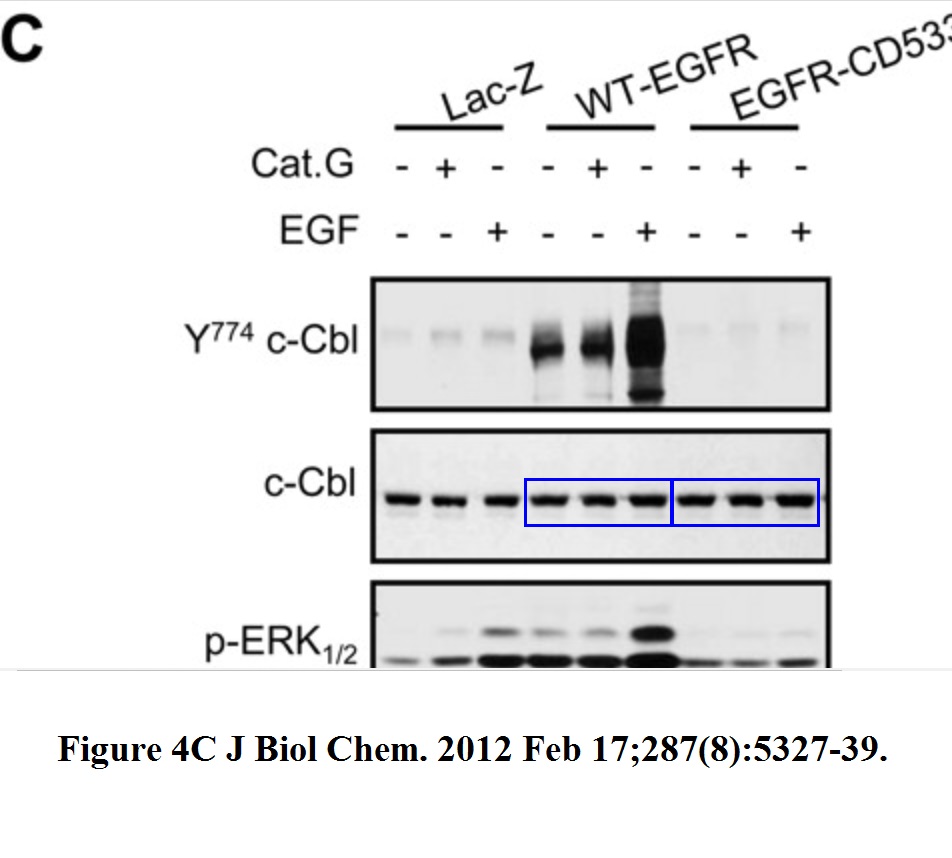


This paper won’t be investigated though, as the publisher told Reuters: “The American Heart Association is not a regulatory body or agency” :
Khadija Rafiq , Mikhail A. Kolpakov , Rachid Seqqat , Jianfen Guo , Xinji Guo , Zhao Qi , Daohai Yu , Bhopal Mohapatra , Neha Zutshi , Wei An , Hamid Band , Archana Sanjay , Steven R. Houser , Abdelkarim Sabri c-Cbl inhibition improves cardiac function and survival in response to myocardial ischemia Circulation (2014) doi: 10.1161/circulationaha.113.007004


Also this by Sabri (but without Houser) is perfectly safe because AHA announced “that it does not view itself as responsible for investigating further“:
Khadija Rafiq , Marie Hanscom , Kristoffer Valerie , Susan F. Steinberg , Abdelkarim Sabri Novel mode for neutrophil protease cathepsin G-mediated signaling: membrane shedding of epidermal growth factor is required for cardiomyocyte anoikis Circulation research (2008) doi: 10.1161/circresaha.107.150573
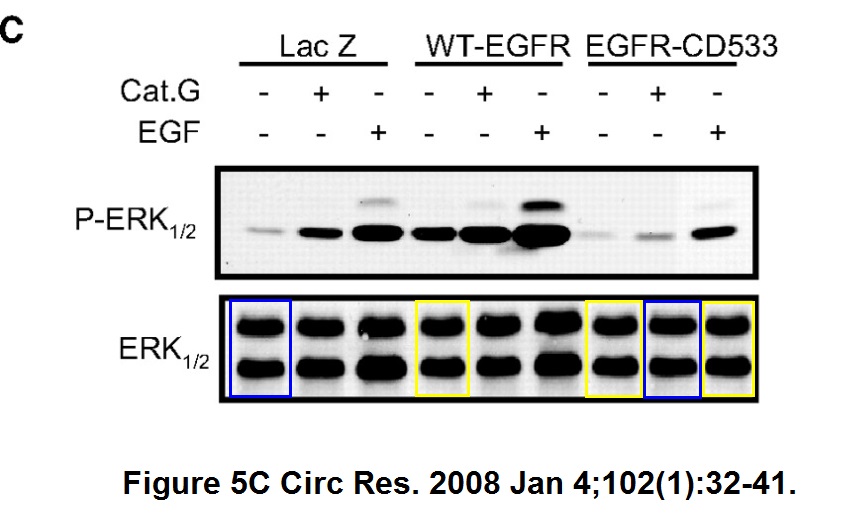



Nevertheless, Sabri is probably toast now, his being a foreigner is definitely not helpful. He may have to return to France where he and his special skills will be met with open arms. I warmly recommend Marseille.
Let’s see how Houser gets out of all this though.
Scholarly Publishing
Targeted Harassment
We remain on the topic of Temple University. You may recall the affair of the Alzheimer’s cheater Domenico Pratico. The fraud in his papers is so staggeringly massive that it somehow awes the Temple University, NIH, HHS-ORI and the journals into doing exactly nothing, or even declare Pratico an innocent victim of slanderous allegations.
Research misconduct: Theory & Pratico
A whistleblower tried to report fraud in Domenico Pratico’s papers via proper channels, and hit a wall everywhere.
The Pratfalls of Domenico Pratico
Next time you wonder why mouse research does not translate to humans, think of Domenico Pratico work on Alzheimer’s and other brain diseases.
Now the Editor in Chief of the Molecular Neurobiology and pharmacology professor at the Nova Southeastern University. in Canada, Benedict Albensi, had a Twitter spat with Cheshire, and an email exchange with me where Albensi asserts his ethics and complains about being harassed and persecuted by a sinister entity, i.e. Cheshire.
This is the Pratico paper it is all about:
Phillip F. Giannopoulos, Jian Chiu, Domenico Praticò Learning Impairments, Memory Deficits, and Neuropathology in Aged Tau Transgenic Mice Are Dependent on Leukotrienes Biosynthesis: Role of the cdk5 Kinase Pathway Molecular Neurobiology (2019) doi: 10.1007/s12035-018-1124-7
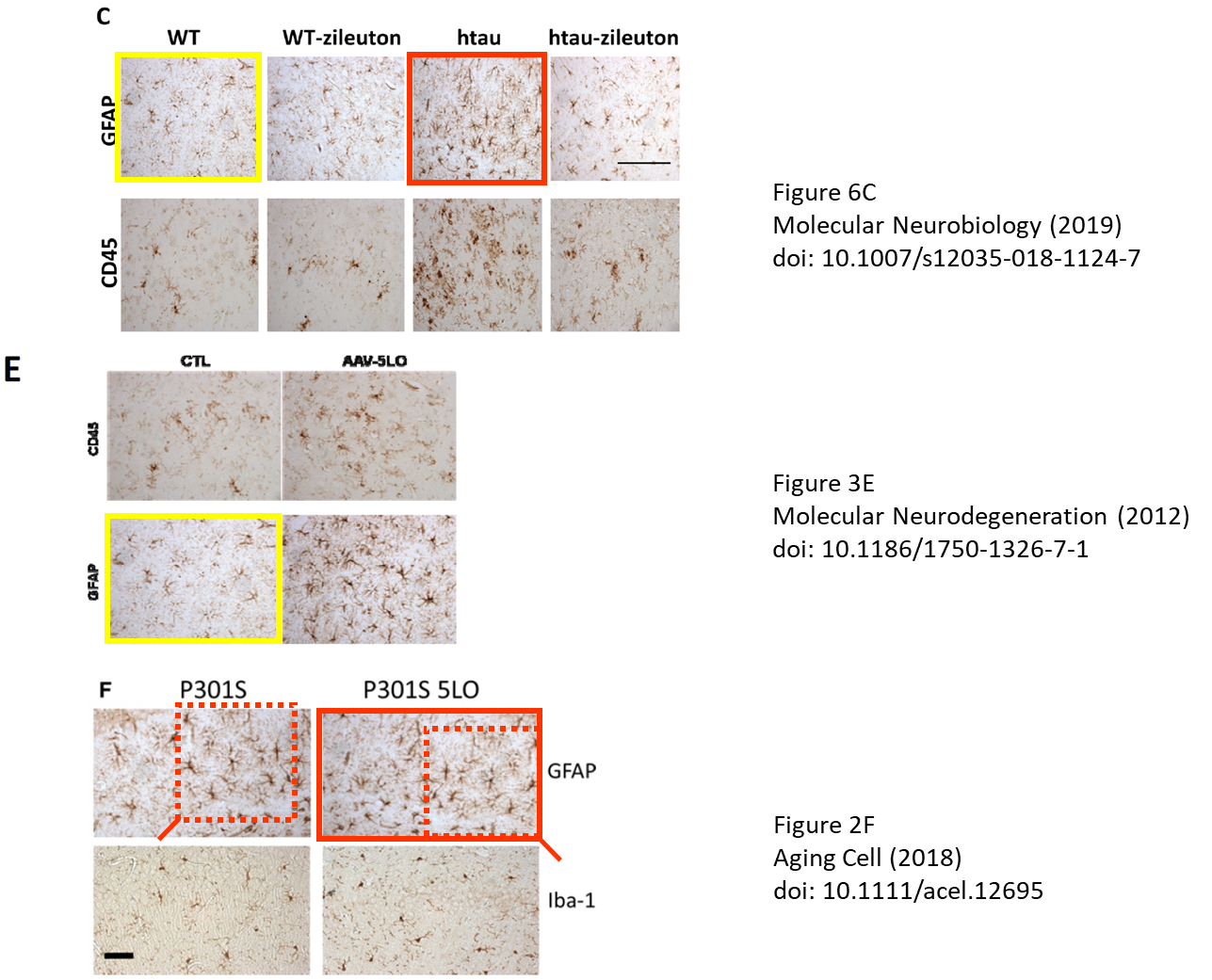
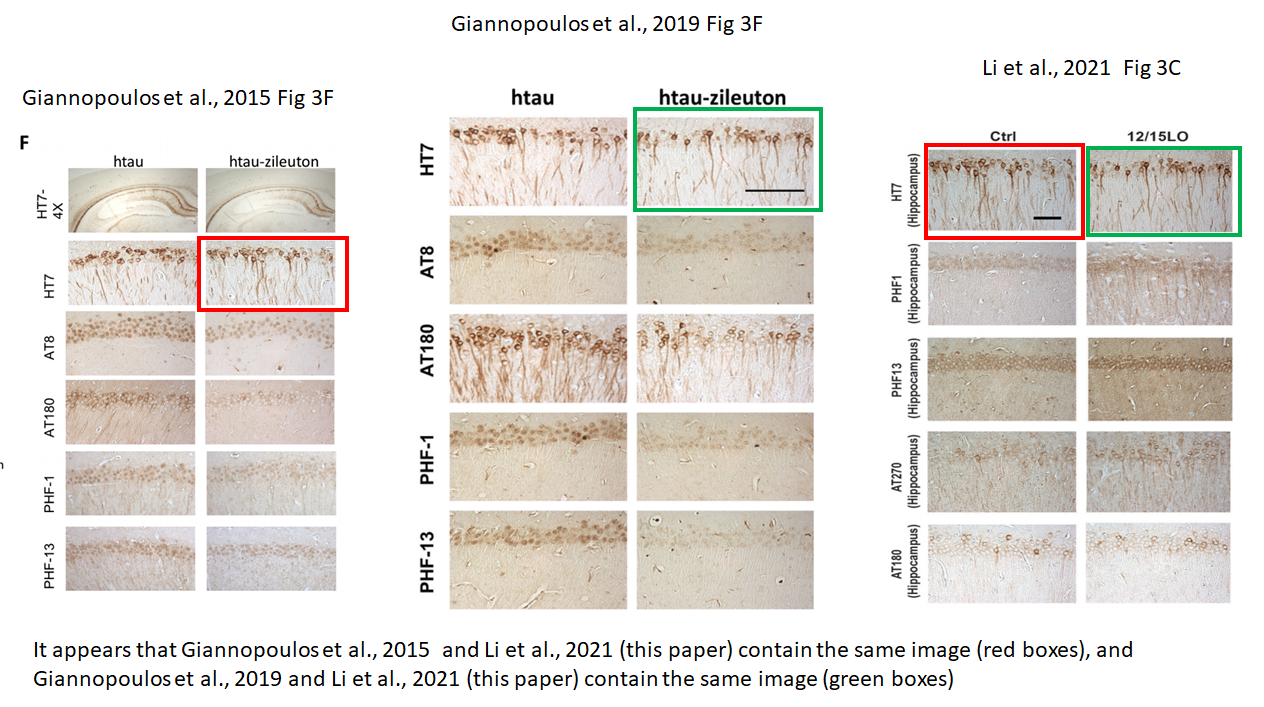
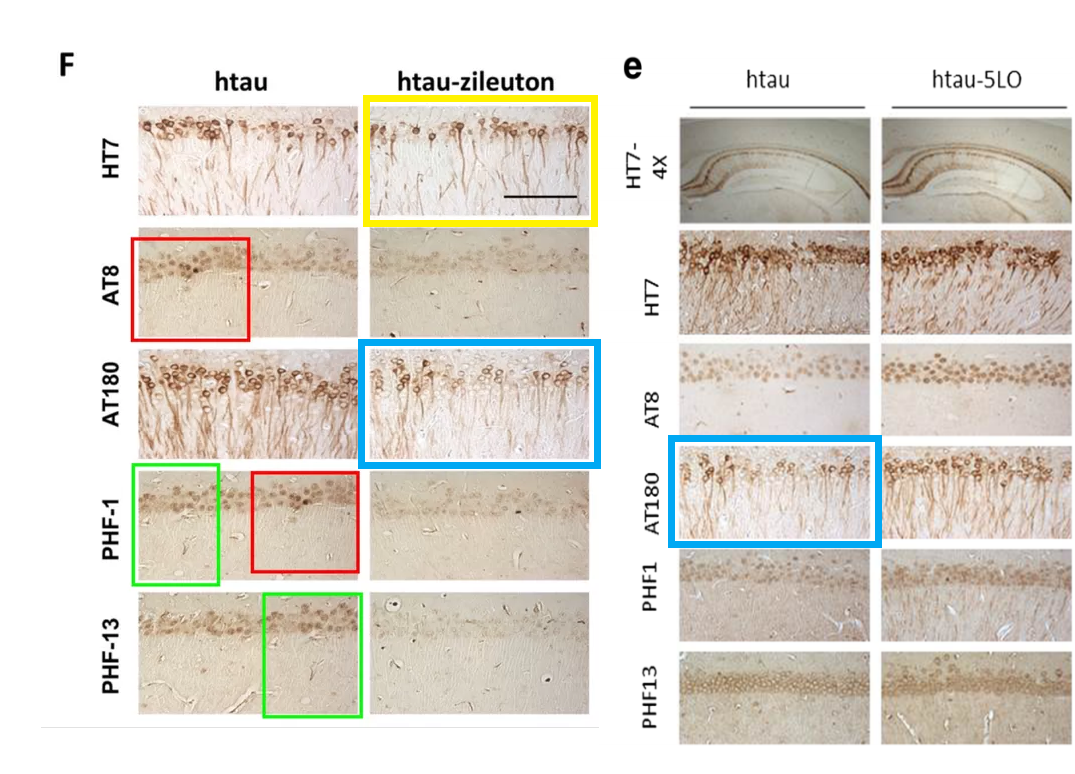
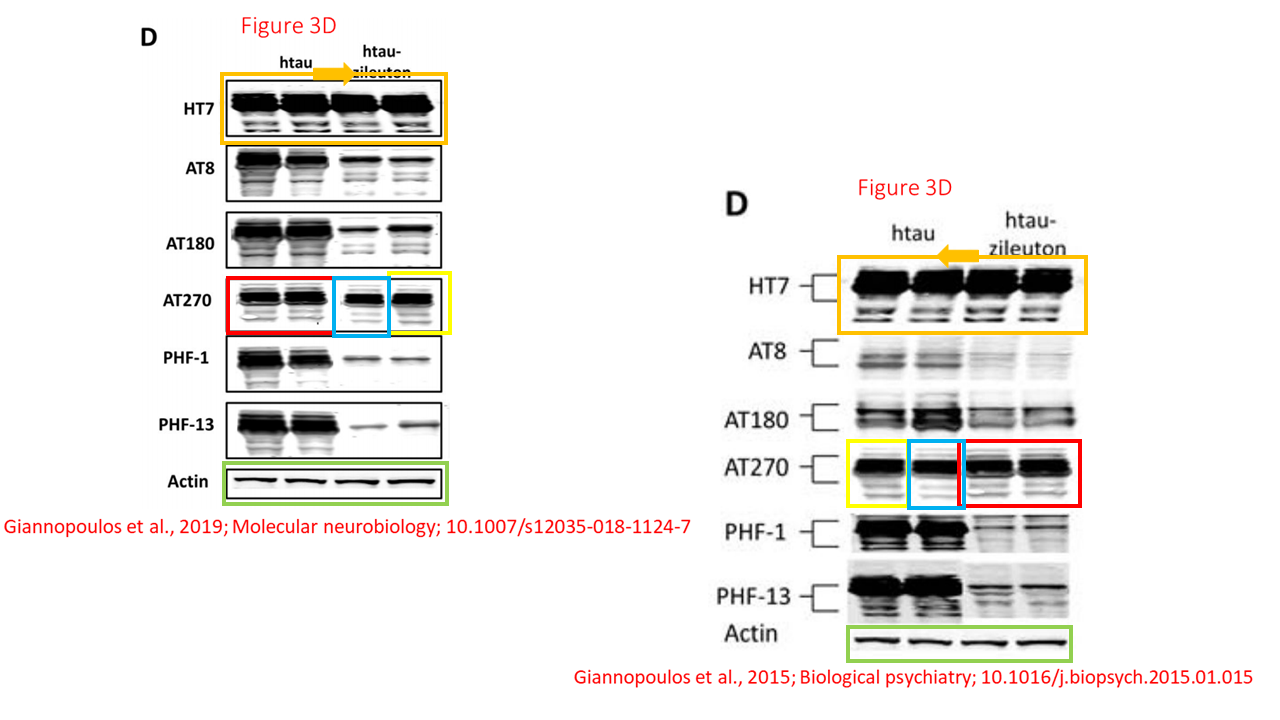
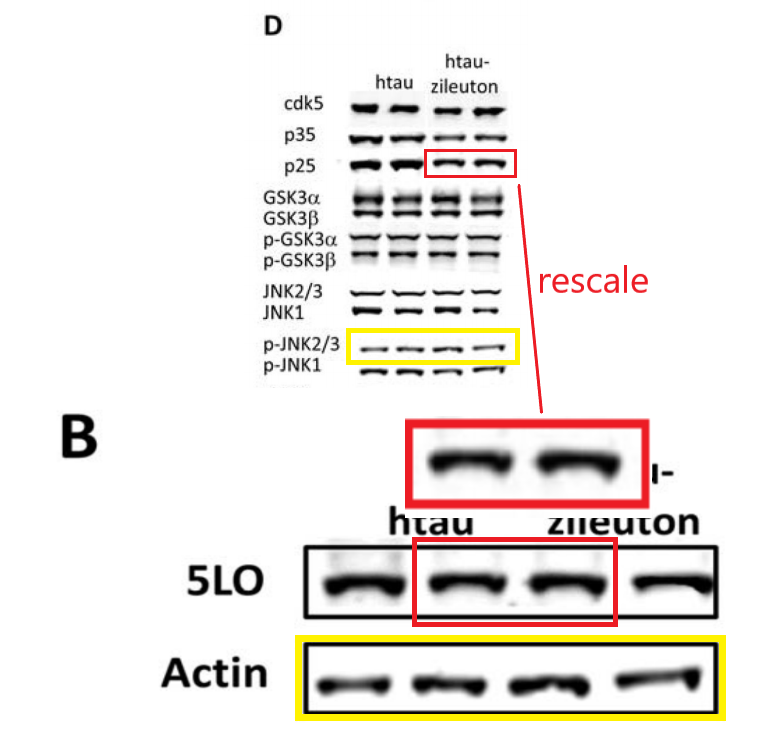
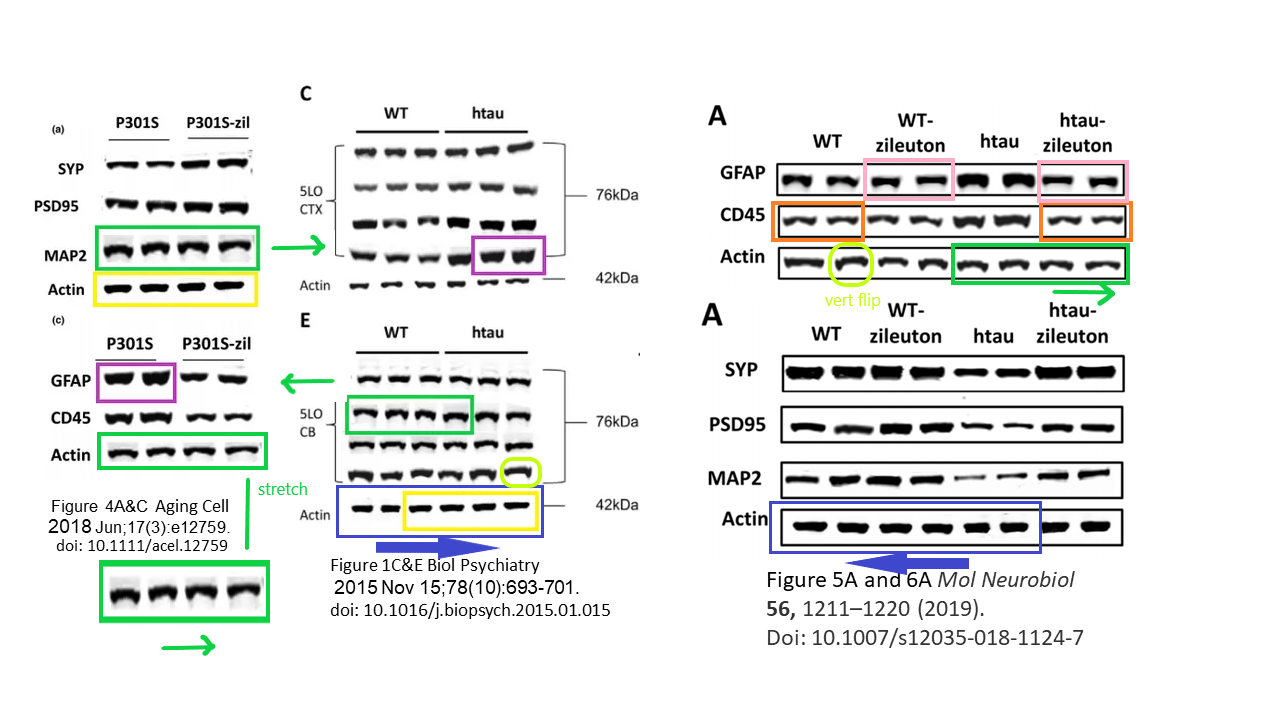
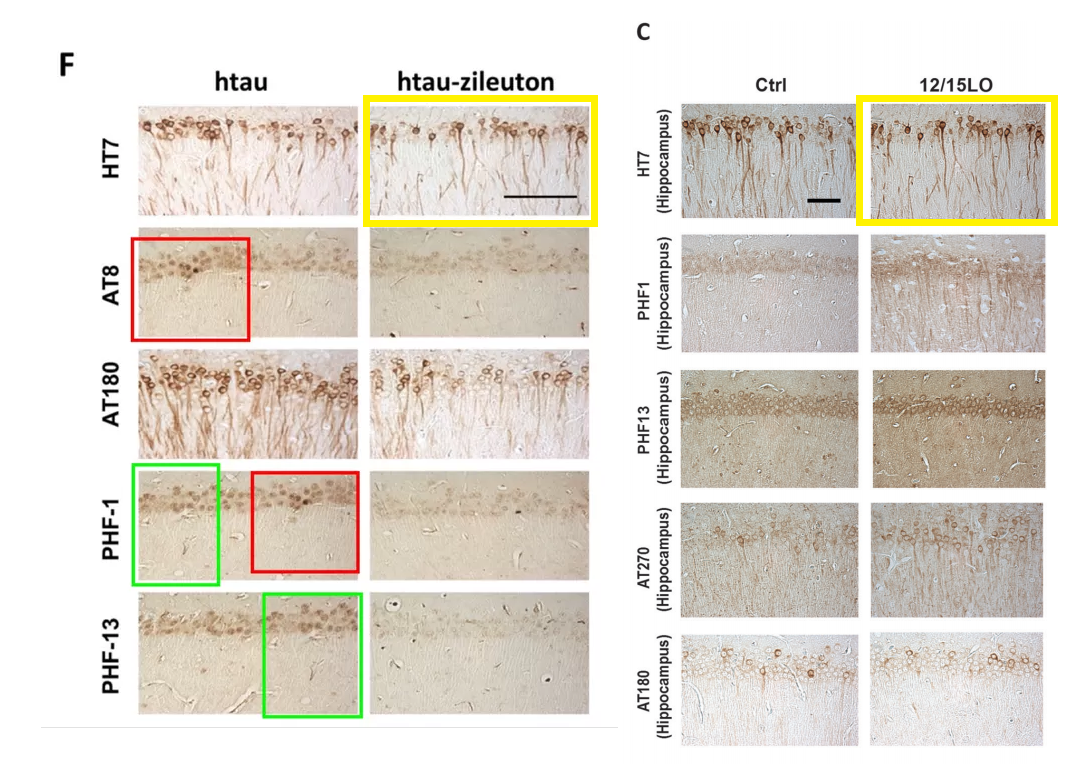

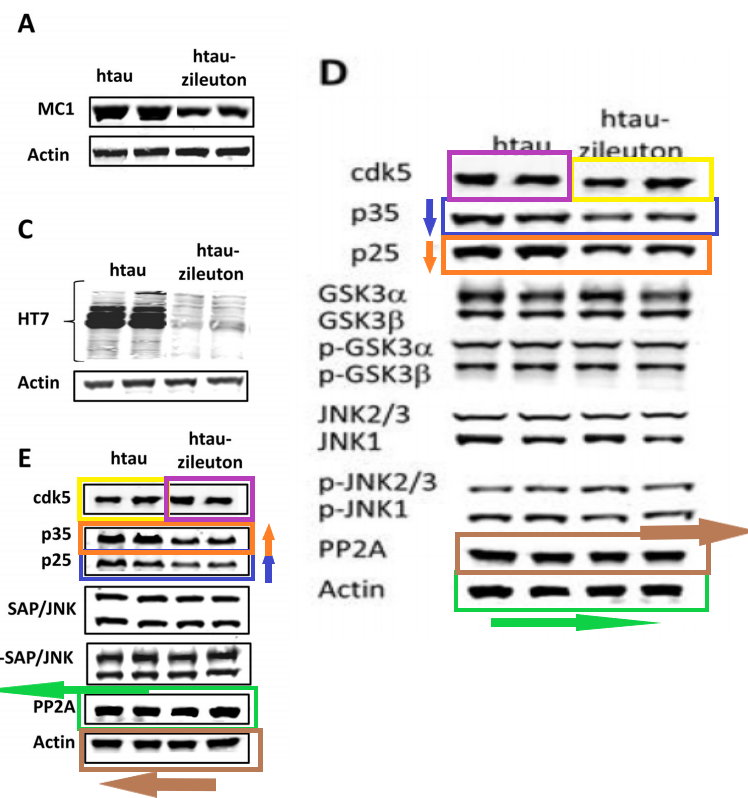

There is much, much more fraud in that one publication, have a look on PubPeer.
It is not exactly clear what needs to be investigated here for so long, the paper was just a year old when the fraud evidence was posted on PubPeer, and now two years have passed. Albensi explained in a comment on my site:
“The publisher initiated an investigation many months ago. I was excluded from the investigation. The publisher is also working with the other journals involved in their investigation and are following COPE guidelines. As far as I can tell the system works since I do see retractions from from the journal in other cases. The process seems slow, however, but the evidence has to be carefully considered. It would be disingenuous and confused thinking to assume there is some kind of conspiracy. I am not sure why the NIH office of integrity and Temple Univ is not working harder on this – perhaps they are and you and others are just not aware.”
Now, actually it is the Editor-in-Chief who ultimately decides about retractions, but Albensi kept insisting on Twitter it was not the case:
And right there and then Albensi started subtweeting that he was the victim of “targeted harassment“.
So I wrote to the poor persecuted Albensi asking what his problem with Cheshire’s questioning his inaction on that fake paper was. Albensi replied:
“I do not even know where to start with how many negative comments your colleague Cheshire and others posted tonight. Their posts then set off a series of other negative posts from around the world. The list included:
- needing “daddy’s permission” when I referred to the publisher
- acting as if I can speed up the process or that I am responsible for the slow response somehow even though I am not part of the investigation
- acting as if I am negligent since there has not been any public statement or response about the paper in Molecular Neurobiology, even though many journals are involved
- stating that I have no “expression of concern” in the matter – nothing could be farther from the truth
- stating I am a “subordinate member of the staff”
- no one is accountable – let us remember that it is the author that is ultimately responsible for their fraud or misconduct
- Albensi is a “failed scientist”
Really? Your friends are going to attack me now?
These comments are not fair and sometimes not accurate. Also, your colleague(s) do not even post their real name(s). I have no idea what their true agenda may be. In addition, even if you are trying to do the “right thing”, your recent article on Aug 31st, hints at conspiracy when you talk about the NIH office of integrity and Temple Univ. This all seems like paranoid thinking to me.
If an author is guilty of misconduct then it is up to the NIH to take their money away, and their home university to fire them. All an editor can do is to retract their paper once any misconduct has been identified. Once the investigation is over, then the possibility of retraction will be discussed.“
Interesting. Albensi apparently just hinted to do nothing about that fake paper until NIH revokes Pratico’s funding and Temple fires him. Now this is some extremely high bar for a retraction, but whatever. Also, why am I “paranoid” by noting that nobody is doing anything about Pratico’s fraud but Albensi is definitely not paranoid at all by assuming Cheshire must be after him personally and have some personal conflict of interest to slander the good name of Pratico? Gosh, maybe Cheshire is Pratico’s disgruntled ex-lover? Or works for a competing biotech, thus seeking to discredit the perfectly honest and efficient Alzheimer’s cures by the likes of Pratico, Cassava Sciences and Althira Pharma?
Cassava fraud and Alzheimer’s capitalism
“even Theranos didn’t submit fake data to FDA”
How to cure all diseases
“I have a passion to solve a problem that is facing millions. I could have a job that makes more money, has normal hours, but this is where I should be right now.” Dr Leen Kawas, CEO of Althira Pharma
Also, Albensi’s insistence regarding the absence of an editorial Expression of Concern that “nothing could be farther from the truth” is kind of confusing because there is indeed no such editorial note. But now there will be, as Albensi told me:
“As you suggest, something will be published in MOLN soon that addresses this issue.”
Unretractable Vecera
Maybe you recall a Nature Communications paper from the University of Erlangen-Nürnberg in Germany, which proved unreliable because a certain junior author fudged up the data. A correction has been in the making for two years, but then Maarten van Kampen proved that paper wrong, and the corresponding author Prof Andreas Hirsch changed his mind about “all findings remain valid” and sent a ready retraction notice to the publisher, which the Nature Publishing Group accepted. That was in February 2022.
Anatomy of a Retraction
From “analysis and conclusion of our paper remain valid” via drafted correction to “the authors retract this publication”. A guest post by Maarten van Kampen.
Yet somehow the agreed, announced and formulated retraction failed to materialise, and the unreliable study continued garnering citations, now standing at 103. It was this Schrödinger’s paper which is simultaneously retracted and not retracted depending on the who opens the box:
Philipp Vecera, Julio C. Chacón-Torres, Thomas Pichler, Stephanie Reich, Himadri R. Soni, Andreas Görling, Konstantin Edelthalhammer, Herwig Peterlik, Frank Hauke, Andreas Hirsch Precise determination of graphene functionalization by in situ Raman spectroscopy Nature Communications (2017) doi: 10.1038/ncomms15192

Apparently something or someone prevented the retraction so far. But who, and how?
In the 7 months since his announcement to retract Vecera et al 2017, Hirsch published no less than 10 new papers, mostly in very prestigious chemistry journals. But publishing in a hurry is never good: Hirsch’s recent study Chen et al JACS 2022, published in May 2022, references the Vecera et al 2017 paper as if nothing at all happened. Hirsch admitted he will need to correct that:
“as you can see in the “Publication History” Section on the web-page – https://pubs.acs.org/doi/10.1021/jacs.2c00642 – our initial manuscript for our publication “Laser-Triggered Bottom-Up Transcription of Chemical Information: Toward Patterned Graphene/MoS2 Heterostructures” was uploaded to JACS on 18. January 2022.
Your first contact this year – regarding our Nat. Commun. paper – dates to 01. February 2022.
Our decision to retract the publication in Nat. Commun. was declared to the editor on 17. February 2022.
Unfortunately, we missed to delete the citation No. 27 in the JACS paper in the context of the final proof reading prior to its publication on 26. May 2022. In the main text of the JACS publication citation 27 is cited together with citation No. 26 . Here the citation 27 has to be removed. No further changes in the next are needed. After Nature Communications has managed to finalize the retraction of our article we will contact the editor of JACS and fix this issue.”

Hirsch also insisted that he alerted the journal about the lack of progress with the retraction just days before I wrote to him. The Nature Communications team manager confirmed:
“As Prof Hirsch mentioned, I have been in correspondence with him with an apology, and explained that the retraction is in the works but there have been unusual delays due to internal understaffing that have impacted the smooth processing of the workflow (which involves a number of steps), exacerbated by the natural shortage of staff resulting from editors taking occasional leave over this period. Given how strongly my team strives for speed and quality, I am particularly sorry that our commitment hasn’t come across on this occasion. Rest assured that there is nothing shady going on in the background; we are working hard to process this and I shall be in contact with Prof Hirsch with periodic updates on where we are.“
It’s truly impressive that Nature Communications and Springer Nature in general perform so well in the department of publishing new papers despite such disastrous understaffing. Apparently, it’s the department of retracting papers where everyone fell sick, got pregnant, quit, or died. Maarten van Kampen wondered in his email to the editor:
“your journal is well on its way to equal and even top its 7400 publications of last year. Sampling a small number of papers I saw no gap of more than 2 months between acceptance and publication, with many being published within one month after acceptance“”
Unless, unless, I am wildly speculating here, a certain co-author and former member of Hirsch lab (who never replied to my contact attempts) may be under misconduct investigation by their university, and now deployed lawyers to prevent the retraction of their paper and of their PhD degree. Especially since their dissertation shares a number of figures with the Vecera et al Nature Communications paper which are now proven as problematic. Hirsch said he was unable to confirm or deny this speculation.

Such things happen elsewhere, in fact sending lawyers is seen as the best way to discourage universities from investigating and journals from retracting your fraud. It sure makes lawyers rich and happy, but doesn’t necessarily lead to desired results long term for the plaintiff.
Reddy vs JBC
Pittsburgh associate professor Raju Reddy and a colleague sued JBC over a retraction. The case has been settled in January 2021, the baddies won and the precedent is set.
Can lawyers influence a misconduct investigation? Case of Tina Wenz
Tina Wenz is a German mitochondria biologist, who was now found guilty of research misconduct in her six publications, authored as postdoc and group leader. The investigation was performed by her former employer, the University of Cologne in Germany, the results were announced in a press release on September 29th 2016. She was instructed to…
Science Breakthroughs
Drop the vaccines
It was always perfectly clear that it will be Israeli scientists who will find a cure for COVID-19.
A press release by the Tel Aviv University, modestly titled:
“Scientific Breakthrough Against COVID-19: Antibodies Identified That May Make Coronavirus Vaccines Unnecessary”
“A scientific breakthrough against COVID-19 has been realized by Tel Aviv University. A team of scientists from the university has demonstrated that antibodies isolated from the immune system of recovered COVID-19 patients are effective in neutralizing all known strains of the virus. This includes the Delta and the Omicron variants. This discovery may eliminate the need for repeated booster vaccinations and strengthen the immune system of populations at risk, according to the researchers.
Dr. Natalia Freund and doctoral students Michael Mor and Ruofan Lee of the Department of Clinical Microbiology and Immunology at the Sackler Faculty of Medicine led the research. […] The study was published on August 5 in the Nature journal Communications Biology.“
Here is the paper which is so groundbreaking excellent it was probably rejected even at Nature Communications.
Ruofan Li, Michael Mor, Bingting Ma, Alex E. Clark, Joel Alter, Michal Werbner, Jamie Casey Lee, Sandra L. Leibel, Aaron F. Carlin, Moshe Dessau, Meital Gal-Tanamy, Ben A. Croker, Ye Xiang and Natalia T. Freund, “Conformational flexibility in neutralization of SARS-CoV-2 by naturally elicited anti-SARS-CoV-2 antibodies” Communications Biology (2022) DOI: 10.1038/s42003-022-03739-5
It builds on the earlier study at PLOS Pathogens, Mor et al 2021:
“Dr. Freund: “In the previous study, we showed that the various antibodies that are formed in response to infection with the original virus are directed against different sites of the virus. The most effective antibodies were those that bound to the virus’s ‘spike’ protein, in the same place where the spike binds to the cellular receptor ACE2. Of course, we were not the only ones to isolate these antibodies […]
“In the current study, we proved that two other antibodies, TAU-1109 and TAU-2310, which bind the viral spike protein in a different area from the region where most of the antibodies were concentrated until now (and were, therefore, less effective in neutralizing the original strain) are actually very effective in neutralizing the Delta and Omicron variants.”
Dr Freund is convinced her discovery will end the COVID-19 pandemic:
“In our view, targeted treatment with antibodies and their delivery to the body in high concentrations can serve as an effective substitute for repeated boosters, especially for at-risk populations and those with weakened immune systems. COVID-19 infection can cause serious illness, and we know that providing antibodies in the first days following infection can stop the spread of the virus. It is, therefore, possible that by using effective antibody treatment, we will not have to provide booster doses to the entire population every time there is a new variant.”
I personally am surprised Dr Freund gave up on coronavirus vaccines. After all, she herself patented several, so what is wrong with those? And in 2017, she patented neutralising antibodies for HIV, which were just as an immense scientific breakthroughs back then as her new coronavirus antibodies are now. She developed those HIV antibodies as postdoc in Michel Nussenzweig‘s lab (Freund et al Science Transl Med 2017) and declared, despite the patents, that she had “no competing interests“. What ever became of that HIV cure?
Academic Dynasties: meet the Nussenzweigs
Star scientists Michel and Andre Nussenzweig come from a famous family of immunologists. Clare Francis looked at some of their papers.
Fat Magic Mushroom
Obesity epidemic is solved now, too. And how!
An article in PsyPost:
“A team of researchers has started to investigate whether psilocybin, a naturally occurring psychedelic compound found in so-called “magic” mushrooms, shows promise as a potential treatment for obesity and eating disorders.
Their initial results, published Translational Psychiatry, indicate that psilocybin does not lead to reduced body weight or food intake in obese mice. But the researchers don’t believe their findings, or lack thereof, should discourage additional studies evaluating the potential of psilocybin in humans.”
Yes, you read right. This is what eating magic mushrooms does to you, you stop believing your own science results. Here is the paper:
Nicole Fadahunsi , Jens Lund , Alberte Wollesen Breum , Cecilie Vad Mathiesen , Isabella Beck Larsen , Gitte Moos Knudsen , Anders Bue Klein , Christoffer Clemmensen Acute and long-term effects of psilocybin on energy balance and feeding behavior in mice Translational Psychiatry (2022) doi: 10.1038/s41398-022-02103-9
The abstract mentions:
“…these preclinical data discourage clinical investigation…”
Basically, a null result. But high on mushrooms, the Danes did not give up:
““Perhaps surprisingly, obesity is a rather treatment resistant disease that shares neuropathological similarities to mental disorders, such as addiction,” explained study author Christoffer Clemmensen (@ClemmensenC), an associate professor at the University of Copenhagen. […]
“We were surprised to see that psilocybin did not have at least a subtle direct effect on food intake and/or body weight in genetic and diet-induced models of obesity and overeating,” Clemmensen told PsyPost.
“Although we failed to discover major effects of psilocybin on mouse energy metabolism and behaviors associated with eating, we believe that there are nuances of the mode of action of psychedelics that cannot be appropriately captured in rodent models. Importantly, psilocybin was safe and had no adverse effects on the physiological parameters we tested in mice.” […]
“I remain excited about this topic, psychedelics for treatment of obesity and eating disorders and I think we should start considering what sub-groups of patients could benefit from this drug class,” he added”
You are stoned, Chris. Go home, and take your fat mice with you.
Frontiers in Autism Quackery
More crazy stuff from Denmark. A press release by Frontiers about the amazing cure for Autism spectrum disorder (ASD):
“The researchers used a computer model that encompasses proteins involved in ASD and the way they interact.
By looking at how different drugs affected proteins in the system, they identified potential candidates to treat it. A commonly used antidiarrheal drug called loperamide was the most promising candidate, and the researchers have an interesting hypothesis about how it may work to treat ASD symptoms.”
Trust Frontiers to publish shit science on autism. I mean, this is how this Open Access publisher originally started in 2007, by publishing garbage autism science by its founders Henry and Kamila Markram, which was rejected everywhere else as too silly.
Is Frontiers a potential predatory publisher?
The Lausanne-based publishing house Frontiers, founded by the neuroscientists Henry and Kamila Markram, has been added to the Beall’s List of potential, possible, or probable predatory scholarly open-access publishers. Was this decision justified? I wish to share here some of my recent investigations.
This is the paper:
Elise Koch and Ditte Demontis, Drug repurposing candidates to treat core symptoms in autism spectrum disorder Frontiers in Pharmacology (2022) doi: 10.3389/fphar.2022.995439
Frontiers press release informs:
“The most promising drug is called loperamide, which is commonly used for diarrhea. While it might seem strange that an anti-diarrheal drug could treat core ASD symptoms, the researchers have developed a hypothesis about how it may work.
Loperamide binds to and activates a protein called the μ-opioid receptor, which is normally affected by opioid drugs, such as morphine. Along with the effects that you would normally expect from an opioid drug, such as pain relief, the μ-opioid receptor also affects social behavior.”
I hope the patents of autistic children won’t starting pumping up their kids with loperamide, because a peer reviewed study told them to. One of the drug’s common side effects is constipation and it is not approved for children under 12.
TCM for Diabetes
Now let’s see how we can solve diabetes.
A press release by University of California, Irvine:
“An extract from the roots of the Rhodiola rosea plant has been found to show promise as a safe and effective non-pharmaceutical option to help control type 2 diabetes, according to a team of researchers led by the University of California, Irvine.
According to a study recently published in Scientific Reports, Rhodiola rosea reduced the number of inflammatory biomarkers and improved insulin response in a mouse model of type 2 diabetes. It also decreased fasting blood sugar levels and altered the composition of bacteria in the gastrointestinal tract.
“The prevalence of type 2 diabetes and the associated health costs have risen steadily in recent decades. Humans have used plants and natural products for thousands of years to treat diseases, and our study shows Rhodiola rosea is a good candidate for further investigation,” said corresponding author Dr. Mahtab Jafari, UCI professor of pharmaceutical sciences. “Current treatment recommendations include lifestyle changes as well as oral and intravenous medications. However, these drugs have significant limitations or side effects, increasing the need for new therapeutic interventions.”
Basically, eat what you want, drop your insulin injections even, because the American professor Dr Jafari and her colleagues found something better.
It works, how else, via the gut microbiome axis:
“Our findings suggest that Rhodiola rosea might be beneficial for treating type 2 diabetes, acting through changes in the microbiome that result in increased gut barrier integrity and decreased translocation of inflammatory molecules into the blood circulation,” Jafari said. “Gut barrier integrity influences body weight and insulin response, and this botanical product may improve the responses of liver and muscle tissues to the insulin produced by the pancreas.”
Here is the paper:
Mahtab Jafari, Jasmin Grace Juanson Arabit, Robert Courville, Dara Kiani, John M. Chaston, Cindy Duy Nguyen, Nilamani Jena, Zhong-Ying Liu, Prasanthi Tata, and Richard A. Van Etten, “The impact of Rhodiola rosea on biomarkers of diabetes, inflammation, and microbiota in a leptin receptor-knockout mouse model” Scientific Reports (2022). DOI: 10.1038/s41598-022-14241-7
As Wikipedia mentions, the arctic plant Rhodiola rosea is popular in Traditional Chinese Medicine and as a commercially available supplement which the FDA warns again. Dr Jafari is a big fan of this plant, as she narrates on her promo website:
“In 2007, we were the first lab to report and publish that Rhodiola rosea increased mean lifespan of fruit flies by 25% while improving their healthspan. After our publication, other labs reported lifespan extension properties in worm and yeast models suggesting that the lifespan extension with this plant is conserved among model species. However, its molecular mechanism of action remains unclear. We continue to perform studies using Rhodiola rosea in hopes of uncovering specifically how it delays the rate of aging, and how it can be used to remedy various age-related diseases.”
See, Rhodiola rosea supplements extends life AND cures diabetes. Dr Jafari will surely live forever:
“Since 2005, we have been assaying pharmaceuticals and natural products for their anti-aging capabilities. We have identified 5 plant extracts and natural products that extended lifespan and improved healthspan: Rhodiola rosea, Rosa damascenca, curcumin, cinnamon, and Angelica keiskei.”
Curcumin. Of course. No phyto-quack will ever do without curcumin. You are expected to buy Dr Jafari’s book.
Lab-grown Tobacco Meat
Finally, a story where a group of Israeli scientists failed to cure anything but didn’t give up. Because whenever your technology fails to be marketed for clinical use (where the real money is), you can still repurpose it for the lab-grown meat hype, since there are enough crazy investors out there. Especially in Israel!
From COVID-19 to Lab-Grown Meat
Enterprising Israeli Scientists show how these things are connected.
An article by Jerusalem Post celebrates:
“A food-tech start-up in Kiryat Shmona named Biobetter, Ltd. has harnessed the inherent advantages of tobacco plants as bioreactors for creating the growth factors necessary for the cellular development of cultivated meat.
This landmark botanical development could significantly reduce the cost of cultured meat and help rapidly advance its commercialization. […]
The Israeli start-up is on a mission to relieve one of the biggest bottlenecks in this emerging industry – the high costs and limited availability of growth factors that play a critical role in multiplying cultured meat cells.[…]
BioBetter was founded by Hebrew University in Jerusalem Prof. Oded Shoseyov, biotech business expert Dr. Dana Yarden and Avi Tzur, an industrialist who sought to put tobacco plant to positive use and was the first investor in the technology.”
How do I know Biobetter used to make pharmacological drugs for people using that exact same “core proprietary technology” which “exploits transgenic plants that co-express target therapeutic proteins“? They used to describe themselves like this:
“Biobetter Ltd. presents a patent-protected innovative platform technology that dramatically simplifies and reduces the cost of protein manufacturing and purification of biologic drugs. The company successfully implemented the innovative platform in producing the human mAb “Humira”, an antibody-based drug indicated for an array of inflammatory conditions, and has the capacity to build a broad pipeline of biopharmaceuticals.”
Nobody ever mentions the biopharmaceuticals anymore. The business lesson is: if your pharma technology fails, try selling it for lab-grown meat while the hype is still on. It works like magic, Biobetter just raised $10 million:
“BioBetter will expand to a larger pilot plant within the Tel Hai Industrial Park in the Upper Galilee. The establishment of the new site will substantially increase its capacity to process tobacco plants, enabling it to meet its current pool of commissions emanating from cell-based meat cultivators globally. The new funding also will be applied to broaden BioBetter’s product portfolio of growth factors. The startup currently is recruiting sufficient new talent to double its workforce.”
News in Tweets
- Ewan Birney, deputy director general of the European Molecular Biology Laboratory and director of an EMBL institute in Cambridge, UK, celebrates yet another eugenicist friend. This time, it’s the University of Amsterdam professor Abdel Abdellaoui who previously announced in Nature Genetics (Abdellaoui et al 2019) that “people who have more genetic variants linked to higher levels of education are on average more likely to live in wealthier areas of Great Britain, whereas people who have fewer of these variants are on average more likely to live in regions that have faced economic challenges, such as coal mining regions.” Yes, it is disgusting, maybe the E in EMBL indeed stands for Eugenics. In any case, EMBL made clear they see no problem even when Birney stumbles into racism.
I am not a racist but…
Some geneticists have very unorthodox ideas. These might sound like racism or eugenics to simple folks, but it is really high science. UK Biobank is apparently on board.
- Adriano Aguzzi, professor at University of Zürich and Switzerland’s self-appointed champion of research integrity, announces to have apprehended and punished another little fraudster. I can’t take a university seriously which defends this bullying clown, whose papers are full of forged data and who ran around for decades parading a non-existent PhD degree.
- “The journal BMC Medicine has decided not to retract a controversial 2013 paper by botanist Steven Newmaster of the University of Guelph (UG) that questioned the purity of herbal remedies and had far-reaching effects on the nutritional supplement industry. An earlier UG investigation had cleared Newmaster of misconduct.” (Science) The system works exactly as it’s supposed to.
- “Earlier on Aug. 1, Kookmin University had said it hadn’t found any serious violations of the academic code of conduct or plagiarism from its eight-month probe into Kim’s Ph.D. dissertation and other academic publications. The university said Kim’s papers contain some “shortcomings” and were “inappropriate according to the current standards,” but that these “insufficiencies” don’t constitute academic misconduct and only scored between 7 to 17 percent on the plagiarism index in a plagiarism checker program.” (Korea Times)
- Let me guess. The other 20 papers are at MDPI?
- Finally, some papermill humour.
I thank all my donors for supporting my journalism. You can be one of them!
Make a one-time donation:
I thank all my donors for supporting my journalism. You can be one of them!
Make a monthly donation:
Choose an amount
Or enter a custom amount
Your contribution is appreciated.
Your contribution is appreciated.
DonateDonate monthly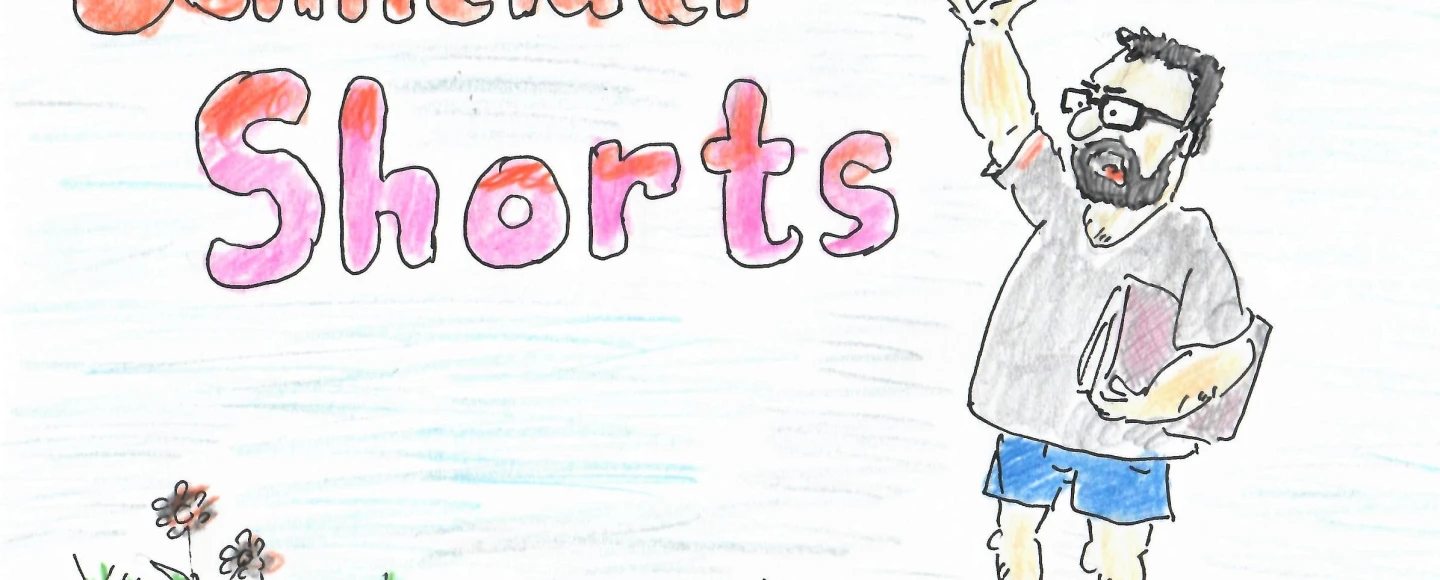

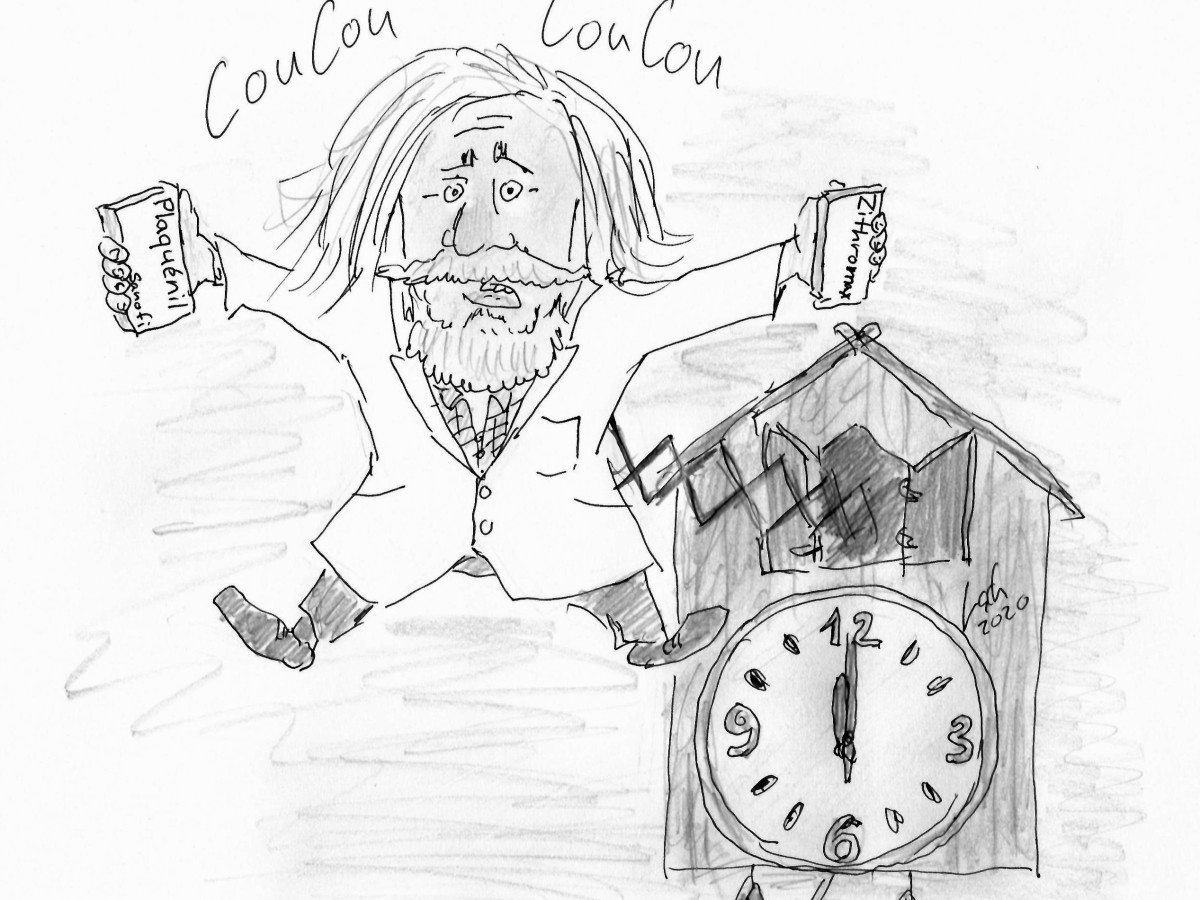




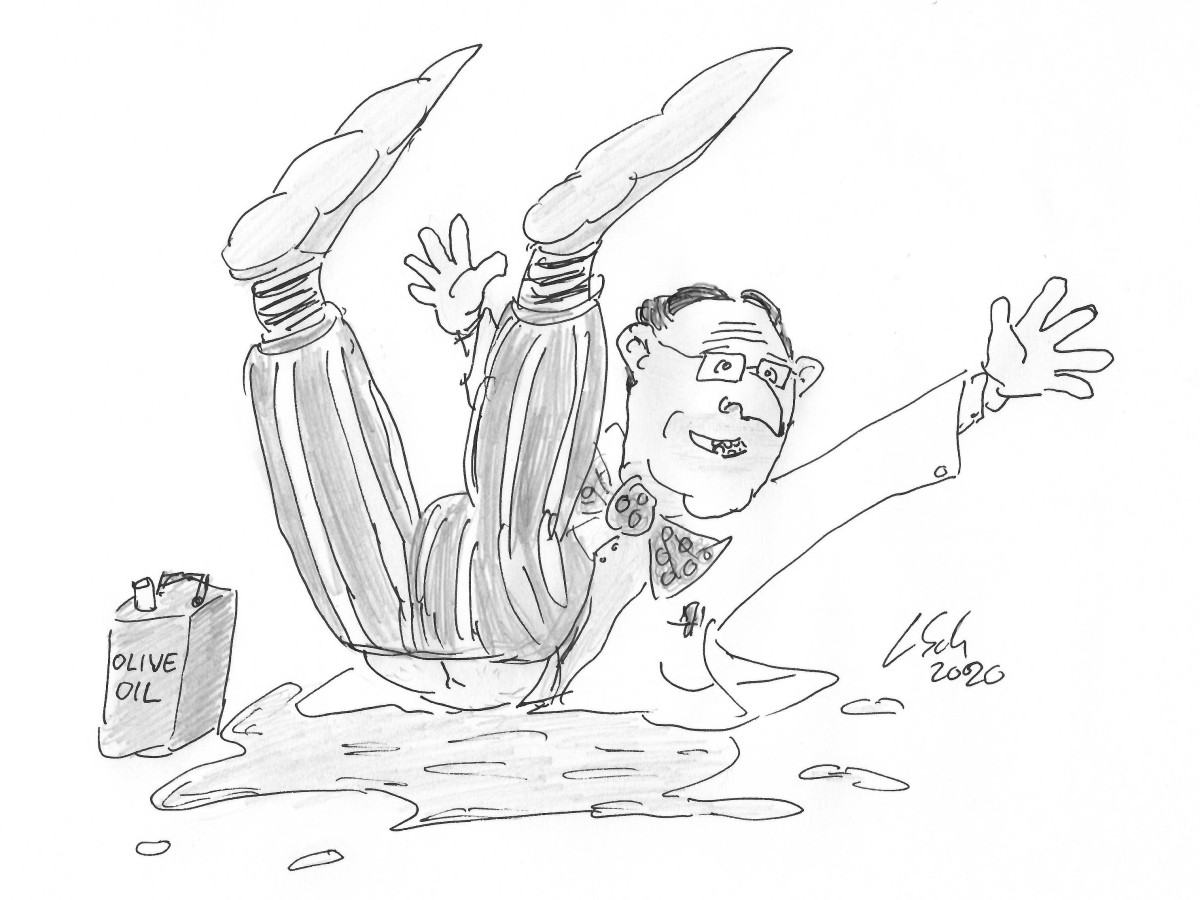







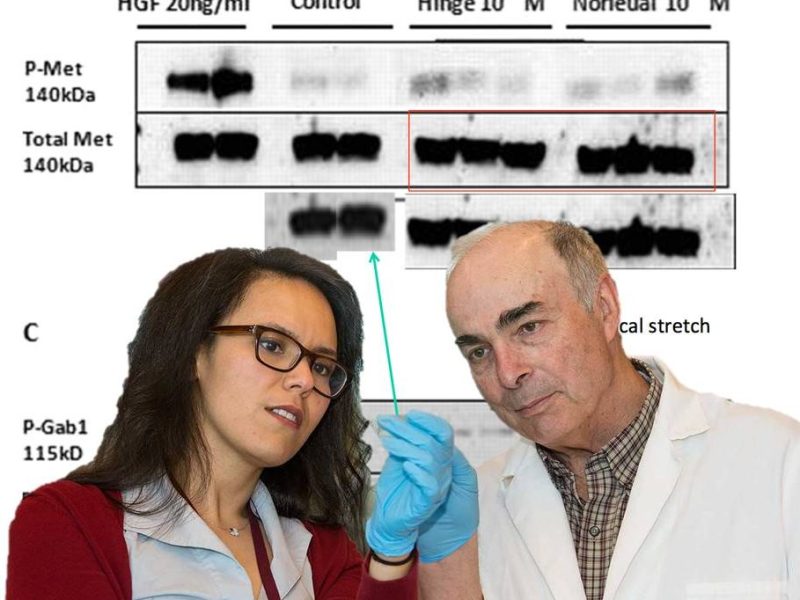
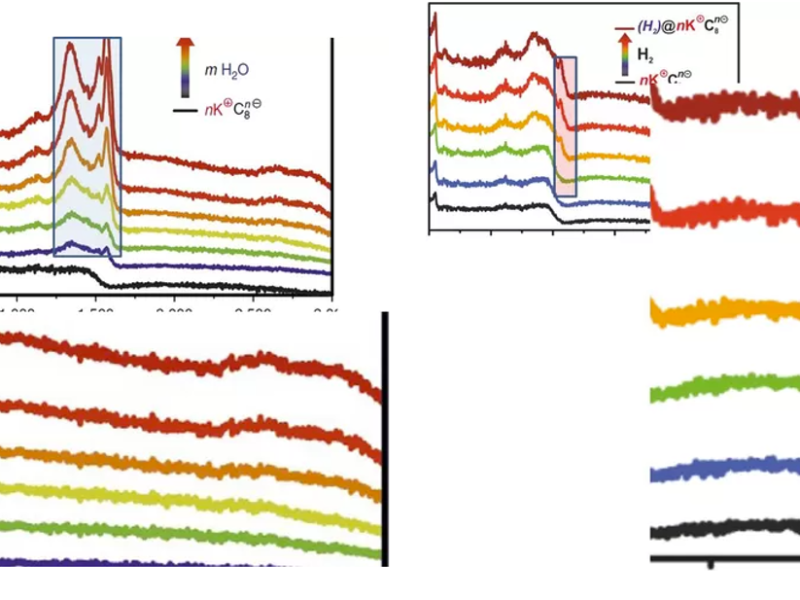


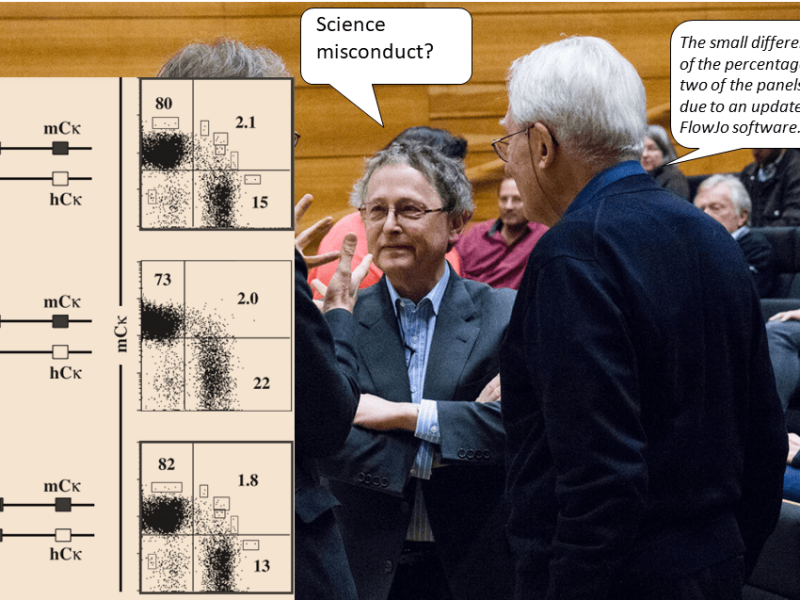




While it might seem strange that an anti-diarrheal drug could treat core ASD symptoms, the researchers have developed a hypothesis about how it may work.
They have also developed a hypothesis about how the Tooth Fairy may work.
LikeLike
You recommend that Abdelkarim Sabri move to Marseille. I recommend that he move to Strasbourg and work with Jean-Philippe Loeffler. Enter the latter’s name into the search box of Pubpeer and press return, or the looking glass icon. Abdelkarim Sabri will see that it is the right place for his skills
LikeLike
Sabri can also do as Carlos Lopez-Otin did and come for a sabbatical to Guido Kroemer’s Centre de Recherche des Cordeliers in Paris. Since Raoult is close friends with Kroemer and his charming wife Laurence Zitvogel, he will sure pop in for a bottle or two of wine.
LikeLike
Kadija Rafiq, who is often author on Pubpeer commented Abdelkarim Sabri papers, is in the same small department (Center for Translational Medicine, Thomas Jefferson University) as Ross Summer who garnered retractions recently and who has appeared on this site. Something to be said for Community Standards.
LikeLike
The two should share a beer after work.
LikeLike
It seems to me that ‘subordinate’ is a correct description for an Editor-in-Chief of a Springer-Nature journal, when this EiC needs a formal permission from a member of the staff of this publisher before he is able to decide to retract a faulty paper from the journal of which he is EiC. See also https://twitter.com/KlaasvanDijk5/status/1569764306002010115?t=lnXYRzRF-vGLBeLUu3pNVw&s=19
LikeLike
High dose loperamide can cause torsade de pointe, a very dangerous cardiac effect. If the finding is that mu opiate receptor must be stimulated, there is a wide array of morphine analogs to choose from. But they are all scheduled drugs. Loperamide is not,because the blood brain barrier expels it quickly from the central nervous system. Meaning to get psychotropic effects you would need a truck load of it. Maybe they failed to get proper authorization for opiate drugs?
LikeLike
Maybe they are just stupid…
LikeLike
Speaking about toxicity, how about Semenza’s paper ( flagged for dodgy figures) that shows cancer in mice being cured using …. Digoxin. One of the most toxic drugs, used to be given in cardiac failure if I remember correctly.
He talked about it as a big thing on the highest imaginable stage: the Nobel lecture.
LikeLike
Eventually, the fraudulent paper of Hirsch and coworker had been retracted (see original retraction note at https://www.nature.com/articles/s41467-022-34281-x).
LikeLike